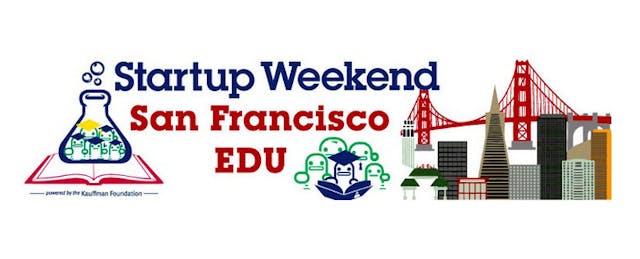Over the past few years, thousands of people have had the thrill of trying to start a company in a weekend, thanks to Startup Weekend workshops.
But you want a serious challenge? Try redesigning a school.
Last weekend (June 7-9), some 130 people bravely rose to the task during the very first SF Startup Weekend EDU: NextGen Schools. Organized by Silicon Schools Fund founder, Brian Greenberg, the weekend was designed to capture all the frenetic energy associated with startups and pour it into reimagining schools. "It's easy to recognize that the factory model of education is broken--it's far scarier to imagine and build next generation schools," declared opening speaker, Alex Hernandez, a partner at the Charter School Growth Fund.
On Friday evening, participants started by sharing 43 pitches for different possible approaches. Find "the critical walls to enforce and then knock down all the rest,” urged Greenberg. With the support of 30 mentors and judges, the 130 people clustered into 15 teams and then spent 54 hours rethinking what school would be. Among the many impressive ideas, three stood out:
- EPIC, a middle school divided into houses á la Hogwarts;
- the Real Magic School Bus: double decker buses serving as mobile learning spaces with the city as the school;
- EduHub, where startups and other organizations co-share a school building to encourage more mentorship opportunities.
These three school models won 1st, 2nd and 3rd place respectively in Sunday night’s final pitch competition.
EPIC, led by Hae-Sin Thomas, CEO of Education for Change Public Schools, aims to “reframe the narrative within the middle school to make it more compelling than the current narrative in the streets in East Oakland.” According to the design, students would be placed into four competitive “houses,” Harry Potter style, that compete against each other. Individual student achievement helps the whole house, building in incentive for students to help another. Students would be defined not by grade levels but by their placement along a 12-level mastery continuum for each content area. In addition, at the end of each six-week block, all students get to adopt a persona and then set out on competitive quests that could take them all over the city.
Common themes emerged among the pitches and presentations: personalized, authentic, and project-based learning, less rigid school structures, more community and parent involvement, peer-to-peer learning, a focus on perseverance and problem-solving, developing entrepreneurial skills, and generally connecting deeper learning to the real world. In reality, few would argue these approaches aren’t great for students, so why aren’t we already doing these in schools?
Devilish Details
Real innovation emerges in design and execution. It’s easy to posit creative ideas for school reform, but hard to implement and sustain innovation. These weekend teams first refined their core innovation before coaches pushed them to building out a full school model around these innovations based a budget of $7500 per student. You want to build a school with project-based learning? What does that look like and how much does that cost?
Several teams--namely UberSpaces, The Maker School and Own It EDU-- proposed building kitchens alongside the classic tech and science labs. One of these teams, the Maker School, showcased the difference between project-based and product-based learning. Their quip: “Our students don’t display their work on the fridge, their work IS the fridge.”
The weekend buzzed with energy and the creative juices flowed right along with the higher-than-usual amounts of caffeine. Mandela Schumaker-Hodge, emcee extraordinaire, founder of Tioki, and winner of the first Startup Weekend EDU back in 2011 kept the energy high with her inspirational quotes and short “dance party intervals.” Chapman Snowden, co-founder of Hack Year, artfully organized the whole event with the help of Christine Ortiz and Jon Skolnick.
Even existing schools wanted to take advantage of the inspiring, incubator-like environment to revise some aspect of their school design. For example, four members of the San Carlos School District, including Superintendent Dr. Craig Baker, spent the weekend delving into how to take the next steps in moving their schools forward. Educators crave spaces where they can collaborate and innovate.
The experiential learning aspect of Startup Weekend events are pure gold: as teams develop their ideas, they model authentic learning in a real world context. Because Silicon Schools Fund and Charter School Growth Fund shared that they are looking for new school models to fund, the context for the weekend could not have been more real or more authentic.
The top two teams, EPIC and The Real Magic School Bus, won support to attend 4.0 Schools Essentials in New Orleans to hone their concepts as well as opportunities to pitch their ideas to Silicon Schools Fund, the Charter School Growth Fund and several superintendents and charter school leaders. These schools could really happen—in fact, it would be surprising if we didn’t see some version of each of the winners launch within two years’ time.
One unexpected prize? Dr. Vincent Matthews, judge and Superintendent of San Jose Unified School District, was so enamored with 3rd place winner EduHub’s idea of bringing startups and organizations into a school that he asked them to visit him to to discuss how they might roll out EduHub in one of his district schools. That’s pure and sweet validation.
Rockstar--or shall we say, school star--judge, Diane Tavenner shared that she so enjoys this kind of event that she had used a similar model with Summit Public Schools 18 months ago when it redesigned its programs. Fellow judge and President of the California Charter Schools Association, Jed Wallace, echoed Tavenner’s support, adding he hopes such events will “signal a new era of discovery and redesign in education, not just a focus on test scores.”
Indeed--among Startup Weekends, SF Next Gen Schools Weekend didn’t just check the box but zoomed straight up the curve to mastery!


